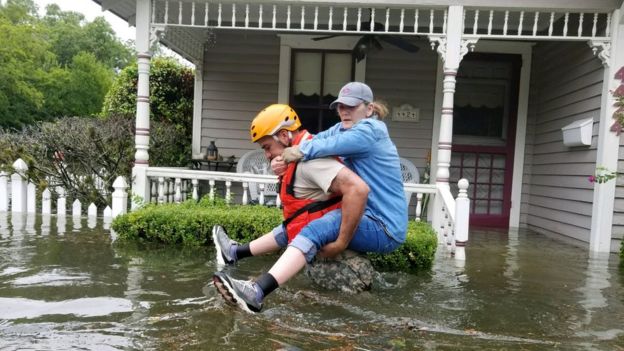 REUTERS
REUTERS
Record amounts of rain have fallen in Texas since Hurricane Harvey hit on Friday. The immediate impacts may be obvious - people having to leave home, states of emergency, burst dams, streets underwater and at least nine deaths connected to the storm - but further down the line this will continue to reverberate.
Population
In some areas, 48 inches (122cm) of rain has fallen. That compares to an average yearly rainfall of 49.77 inches and explains the flooded streets, homes and businesses.
More than 30,000 people are temporarily homeless and of those who have been able to stay in their homes, tens of thousands were left without electric power.
Tens of thousands of people stayed overnight in shelters at the weekend, 9,000 of them in a convention centre that was opened up for them and hundreds in a private furniture shop.
Where will they go?
Another Gulf Coast disaster might offer a glimpse into Houston's future. Twelve years ago when Hurricane Katrina hit New Orleans, hundreds of thousands of people were displaced. The city's population never bounced back; it still stands 50,000 below pre-Katrina levels.
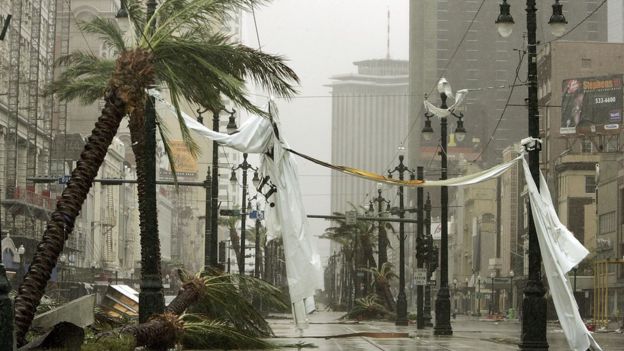 GETTY IMAGES
GETTY IMAGES
But Gail Delaughter, who is herself from New Orleans, told the BBC there is one major difference between what happened there and what is happening in Houston.
She said: "The dynamic is kind of different because in New Orleans the entire city was devastated.
"Here, you have a situation where some neighbourhoods have suffered devastation and some haven't. Houston is a large and spread-out city. It's just a different situation from place to place.
"There is talk of bringing in some trailers but that's all being worked out at this point - for a lot of the people it just remains up in the air where they're going to go.
"A lot of people are low income and don't have the means to just up and go."
- Have New Orleans lessons been learned?
- Too poor to flee the hurricane
- The 'navy' formed after Katrina that's helping people in Houston
The New Yorker magazine's Malcolm Gladwell argued that after Katrina, lower-income people who were displaced got new chances at improved lives. Former prisoners who went to new neighbourhoods after being released were significantly less likely to re-offend compared with those who went back to their old neighbourhoods.
And 40,000 people moved to and stayed in Houston, he said, where social mobility was much higher than in New Orleans. A child born in the bottom fifth of US income in Houston had a 9.3% chance of making it to the top fifth by the age of 26, compared to a 5.1% chance in New Orleans, one of the worst in the country.
Environment
Fifteen trillion gallons of water have so far fallen on Houston - more than twice as much as fell on New Orleans during Hurricane Katrina.
There are signs of ways in which environmental changes may have made the hurricane worse - the warmer air gets, for instance, the more moisture it can hold in it.
And the storm, in its turn, has had significant consequences for the local environment.
The water was contaminated in places and, as it began to recede, residents noticed rubbish, broken road signs and even sewage lying in it.
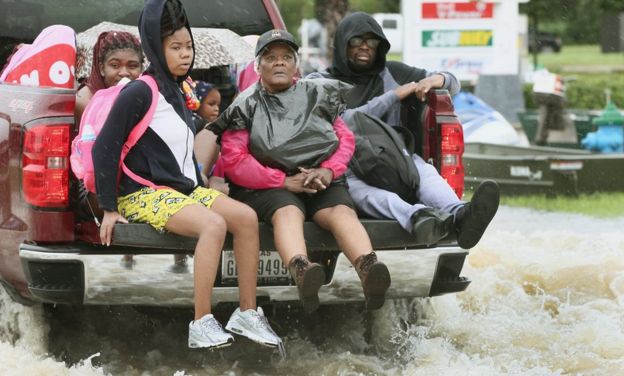
GETTY IMAGES
Some people were concerned on Monday as people in eastern Houston reported an "unbearable" smell coming from petrochemical industry areas, that was causing headaches, sore and itchy throats and itchy eyes in residents who were trapped by flooding. A few hours later, it was reported to have been caused by a chemical spill from a ruptured pipeline.
Great movements of water like this can also cause displacement of animals. Many of the environmental effects will have to be calculated after the human disaster is dealt with, but among those attracting attention now are the owners of an alligator farm who warned on Monday that hundreds of the reptiles would be set free if the water rose by just another foot.
And fire ants, ejected from their underground homes, made floating islands to keep their queens alive until the water receded.
There may be other negative effects that become clear in the future - near New Orleans, Hurricane Katrina damaged swamps that play a vital part in absorbing floodwater, so making future flooding more likely.
People's health
Multiple hospitals and nursing homes have been evacuated due to the floods, and hospitals have had to rely on backup systems for electricity and internet access.
In a disaster situation like this, routine appointments are often disrupted too. The Washington Post interviewed John McMillian, who was in town for five days of leukaemia treatment but was cut off from the hospital and could not make it to the fourth day.
People have been warned to make sure their tetanus vaccinations are up to date before they start clearing up in their homes, because of the risk of stepping on something sharp. And as some stagnant water is left behind it may become a breeding ground for mosquitoes, which in Texas can carry West Nile virus, a potentially-fatal fever.
The economy
Houston is at the centre of many industries, chief among them energy. The area is home to almost half of US refining capacity and a fifth of its oil production, meaning it makes a 2.9% contribution to US GDP. But property damage has stopped half the area's oil refineries from working, and the low supply pushed the US financial market price of petrol up 4% to a two-year high.
One estimate suggests two million barrels a day of refining capacity has been lost - equivalent to about 10% of US national demand for products such as petrol, aviation fuel and heating oil.
Morningstar Commodities Research said on Tuesday that 11 more refineries, with a combined capacity of 1.3 million barrels per day, were at risk of closure.
The economic damage was not confined to the energy industry, however. Outside the city, the deluge wiped out a promising crop of cotton, and there are reports of farmers working 24 hours a day as the storm approached but still not managing to bring the whole harvest to safety.
Water will recede and properties will dry again after the flood, but it will take months or years to clean homes and businesses and make them fit for purpose again. It is estimated the insurance bill will hit more than $10bn.
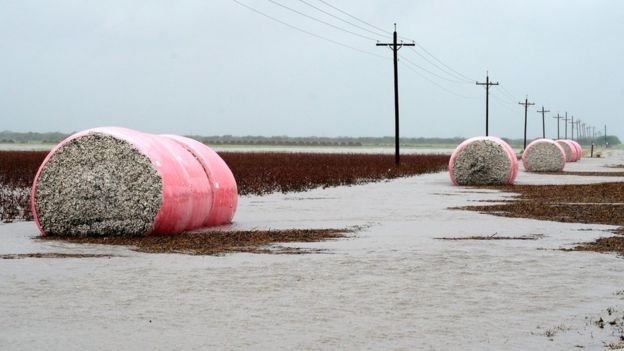 REUTERS
REUTERS
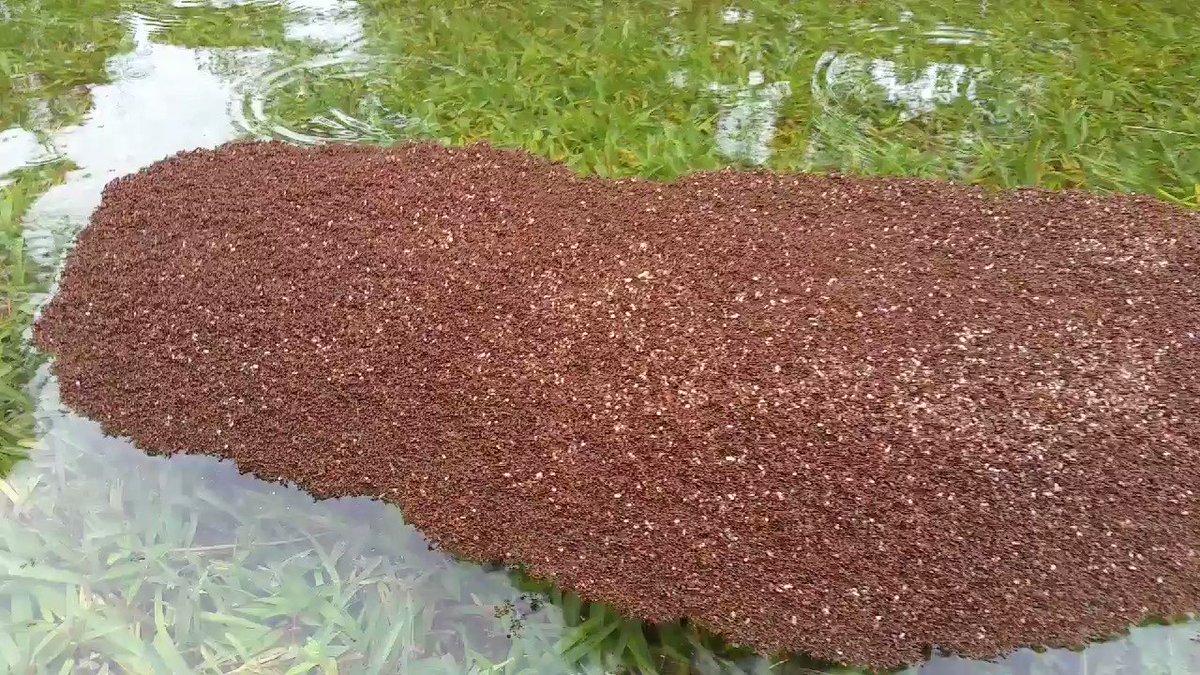
No comments:
Post a Comment